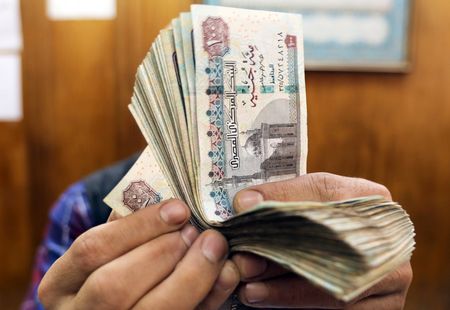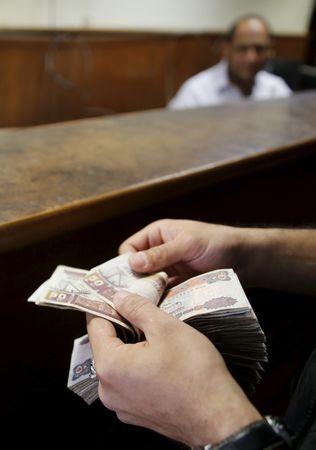By Patrick Werr
CAIRO (Reuters) – The gap between the official rate of the Egyptian pound against the dollar and the price on the black market has widened further, putting pressure on Egypt ahead of a crucial International Monetary Fund board meeting next week.
Egypt continues to face a foreign currency shortage despite two major devaluations this year.
The International Monetary Fund is due on Dec. 16 to review Egypt’s request for a $3 billion Extended Fund Facility to help shore up its finances. Egypt and the IMF announced the package at the staff level on Oct. 27.
Deputy Finance Minister Ahmed Kouchouk said on Wednesday he expected the IMF board to approve the package at the meeting.
When Egypt announced the staff-level agreement, it said it had moved to a “durably flexible exchange rate regime, leaving the forces of supply and demand to determine the value of the EGP against other foreign currencies”.
In a statement issued by the cabinet on Friday, Kouchouk reiterated that the agreement with the IMF aimed to achieve a flexible exchange rate.
Dealers on the black market were selling dollars for 32 to 33 pounds compared to the official rate of about 24.6 to the dollar. Street level vendors were buying dollars for around 30 pounds.
The widening gap with the official rate has led many analysts to believe Egypt may let the currency weaken yet again before the IMF meeting, possibly hiking interest rates as well.
“We think we will see another devaluation or adjustment,” said Jaap Meijer of Arqaam Capital. “However we do not expect a devaluation to the 32-34 handle as now implied by the London listings or the black market.”
The pound was devalued 14.5% against the dollar on Oct. 27. Since early November, the central bank has been allowing the official rate to weaken incrementally by an average of about 0.01 pounds per day.
Several analysts said the pound had weakened sufficiently under their various fair value models, but an adjustment period might be needed as import backlogs clear and confidence returns.
“The last devaluation brought the Egyptian pound to fair value,” said Charles Robertson of Renaissance Capital, adding that his model might not reflect the exchange rate as accurately immediately after a devaluation.
Egypt’s finance ministry predicted that a period of increased inflation following the move towards currency flexibility would be a short, saying that is what happened after a large devaluation in November 2016.
“Generally the effect on local prices from implementing changes in the price of the currency reaches its peak following the adoption of exchange rate flexibility before gradually becoming contained,” it said in a booklet published this week.
(Reporting by Patrick Werr; Editing by Aidan Lewis and Mark Heinrich)












